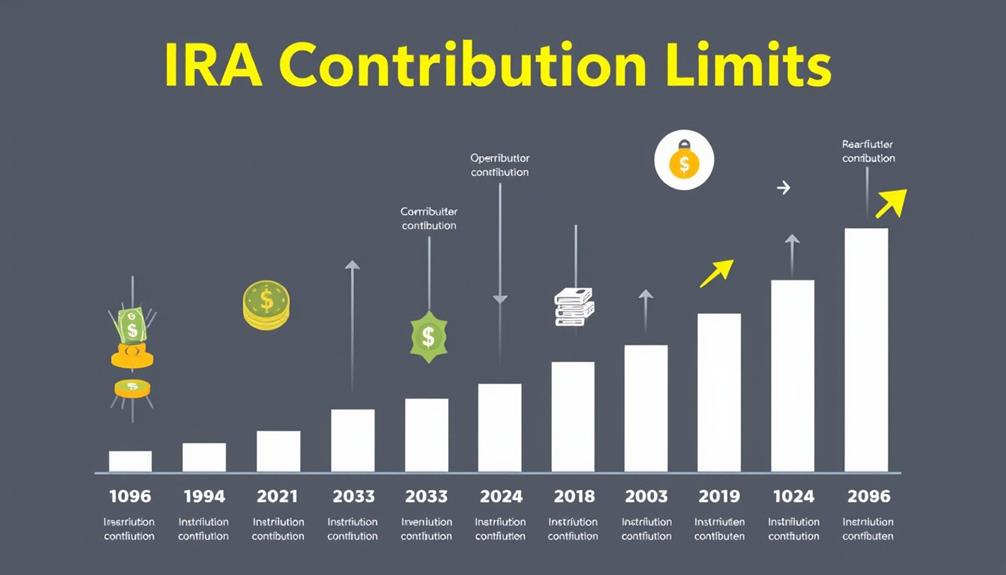Withdrawing money early from your IRA can lead to big fees, but in certain situations, it could be the right move. If you’re dealing with expensive education bills, buying your first house, or facing major medical costs, you might be eligible for penalty-free access. Roth IRAs also have perks since you can take out your contributions without penalties at any age. Keep in mind that taking out money early can really hurt your retirement savings, wiping out potential growth. Think about your choices carefully because it’s usually better to check out different ways to finance things first. There’s a lot more to learn about making the most of your financial journey. If you want to secure your financial future, it’s crucial to be well-informed.
Key Takeaways
- Early withdrawals should be a last resort due to penalties and long-term impact on retirement savings.
- Utilize exceptions like higher education costs or first-time home purchases for penalty-free access to funds.
- Consider hardship withdrawals for total disability or significant medical expenses to avoid early withdrawal penalties.
- Explore alternative financing options, such as personal loans, to meet immediate needs without affecting IRA growth.
- Assess the future growth impact of withdrawing funds, as it can significantly reduce retirement savings over time.
Understanding Early Withdrawal Penalties

When you consider tapping into your IRA funds early, it's vital to understand the penalties that come with it. Early withdrawals from a traditional IRA before you turn 59½ usually incur a 10% additional tax penalty on top of your regular income tax. This means that if you take distributions from IRAs, you'll not only face the early withdrawal tax but also see your taxable income skyrocket for that year, potentially leading to a hefty tax bill.
Additionally, it's important to be aware of your financial goals before making such decisions, as they can greatly affect your long-term retirement planning.
If you're thinking about early withdrawals from SIMPLE IRAs, be aware that the stakes are higher. Within the first two years, you'll face a staggering 25% additional tax penalty.
Fortunately, there are exceptions to the penalty, such as using funds for higher education, first-time home purchases (up to $10,000), or medical expenses that exceed 7.5% of your adjusted gross income (AGI).
Keep in mind that when you report early withdrawals, you may need to fill out Forms 1040 and 5329. The latter is important for claiming any exceptions to the early withdrawal penalty, so it's important to understand these details before making any moves.
Key Exceptions to Withdrawal Rules

Many people aren't aware that there are key exceptions to the early withdrawal penalties associated with IRAs. Understanding these exceptions can help you access your funds without facing a hefty penalty.
For instance, in addition to early withdrawals for specific purposes, individuals can also consider strategies like investing in a Gold IRA as a way to diversify their retirement savings while still keeping the potential for growth.
Here are some important scenarios where you can withdraw early without incurring the typical 10% penalty:
- Higher education expenses paid directly to an institution
- First-time homebuyers can withdraw up to $10,000 for their primary residence
- Total and permanent disability of the account owner
- Unreimbursed medical expenses exceeding 7.5% of your adjusted gross income (AGI)
- Roth IRAs allow tax-free and penalty-free withdrawal of contributions at any age
While you'll generally face penalties on early withdrawals from traditional IRAs, these exceptions provide you with some flexibility.
For instance, if you're planning to buy your first home, you can dip into your IRA without a penalty. Similarly, if you're dealing with medical expenses or a disability, your IRA can offer financial relief.
Keep these exceptions in mind as they might just save you from unnecessary penalties when accessing your IRA funds early.
Strategies for Early Withdrawals

Maneuvering the complexities of early IRA withdrawals can feel intimidating, but with the right strategies, you can access your funds while minimizing penalties. One effective approach is to explore hardship withdrawals, which can help you avoid the 10% penalty for specific circumstances like total and permanent disability or significant medical expenses.
Additionally, for those considering alternative investment options, precious metal investments can provide a viable strategy for diversifying your financial portfolio. This way, you can address urgent financial needs without severely hurting your retirement savings.
If you're considering Roth IRAs, remember that while you can withdraw contributions tax-free at any age, early withdrawals of earnings may incur taxes and penalties unless they meet qualified distribution criteria. Always evaluate the impact on your long-term growth, as withdrawing a significant amount now can dramatically reduce your retirement savings—potentially costing you hundreds of thousands in future earnings.
Before opting for early withdrawals, consider alternative strategies like home equity loans or personal loans. These options can provide immediate cash flow without jeopardizing your IRA account's growth potential.
Tax Implications of Withdrawals

Understanding the tax implications of IRA withdrawals is essential for making informed financial decisions. When considering early withdrawals, it's vital to recognize how these can affect your overall tax liability.
- Traditional IRAs usually impose a 10% penalty for early withdrawals before age 59½.
- All distributions from traditional IRAs are taxed as ordinary income, impacting your tax bracket.
- For example, a $50,000 withdrawal at age 50 could lead to around $17,000 in taxes and penalties.
- Certain situations, like higher education expenses or first-time home purchases, may allow for penalty-free withdrawals.
- Roth IRAs permit tax-free withdrawals of contributions at any age, but earnings withdrawn early may incur taxes.
When you strategize your withdrawals, keep these tax implications in mind. If you withdraw from traditional IRAs, you'll face both taxes on the amount and a potential penalty.
On the other hand, Roth IRAs can offer more flexibility with your contributions. Understanding these factors will help you make better withdrawal strategies to minimize your tax burden and maximize your financial well-being.
Long-Term Impact on Retirement Savings

While being aware of the tax implications of early IRA withdrawals is important, it's equally essential to contemplate how those withdrawals can impact your long-term retirement savings. When you withdraw funds early, not only do you face income tax and a 10% penalty if you're under age 59½, but you also diminish your IRA balance, which affects future growth.
For instance, withdrawing $50,000 at age 50 can lead to nearly $200,000 lost in potential earnings by retirement age, largely due to the compounding effect. This loss can greatly hinder your financial stability in retirement, as each early withdrawal chips away at the growth of your retirement accounts.
You might think about alternatives like home equity loans or personal loans, which can provide necessary cash flow without adversely affecting your retirement savings. Engaging in early withdrawals should be a last resort.
The long-term impact on your retirement savings can be profound, often jeopardizing your ability to meet future expenses. Prioritizing the preservation of your IRA and other retirement accounts is vital for achieving your financial goals.
Frequently Asked Questions
Is It Worth It to Withdraw From IRA Early?
Withdrawing from your IRA early can seem tempting, but it often leads to penalties and taxes. Consider your financial situation carefully; the long-term impact on your retirement savings could outweigh the immediate benefits.
What Is the Best Withdrawal Strategy for Early Retirement?
Imagine savoring a sunset, knowing your finances are secure. For early retirement, consider a flexible withdrawal strategy, adjusting as needed. Prioritize taxable accounts first, and always account for taxes to preserve your nest egg.
How Does an Early IRA Withdrawal Work?
An early IRA withdrawal means you can access your funds anytime, but expect income tax and possible penalties. If you're under 59½, you'll face a 10% penalty unless you qualify for exceptions.
What Is the Best Way to Withdraw Money From an Ira?
Imagine steering through a winding river; the best way to withdraw from your IRA is to chart a course based on your age, tax implications, and income needs, ensuring smooth sailing towards your financial goals.
Conclusion
In steering through the winding road of early IRA withdrawals, it's crucial to tread carefully. While life can throw curveballs that prompt you to dip into your nest egg, remember that every choice comes with its own set of consequences. Embracing strategies and understanding the implications can help you make informed decisions. So, weigh your options wisely; sometimes, the golden years can wait a little longer while you build a brighter financial future.









